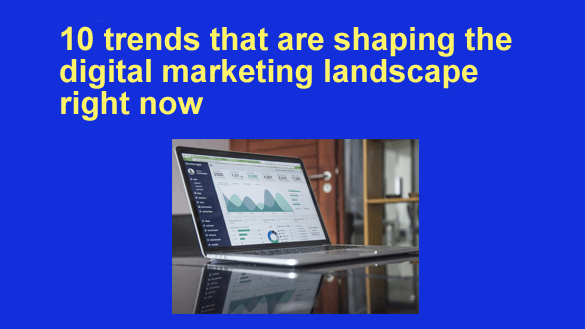 The digital marketing landscape is an ever-evolving arena, where new trends and technologies emerge at lightning speed, reshaping the way brands connect with their audience.
The digital marketing landscape is an ever-evolving arena, where new trends and technologies emerge at lightning speed, reshaping the way brands connect with their audience.
In today’s digital age, keeping abreast of these trends is not just advantageous; it’s imperative for marketers aiming to stay ahead of the curve and captivate their target audience effectively. From the integration of artificial intelligence to the rise of ethical marketing, this article delves into the top 10 trends currently sculpting the digital marketing sphere.
By comprehending and capitalizing on these trends, businesses can navigate the complexities of the digital world, ensuring their marketing strategies are not only relevant but also impactful in an increasingly competitive landscape.
AI and Machine Learning
Artificial intelligence (AI) and machine learning are revolutionizing the way marketers analyze data and automate campaigns. These technologies enable more personalized and targeted marketing strategies by predicting user behavior and optimizing ad placements.
AI-driven chatbots and virtual assistants are also enhancing customer service by providing instant, 24/7 support. As AI continues to advance, its applications in digital marketing are expected to expand, making it a key trend to watch.
The Rise of Online Education
The demand for digital marketing skills is growing, and online education platforms are playing a crucial role in meeting this need. An online digital marketing degree or certification can provide marketers with the latest tools and techniques to stay ahead in the industry. These programs offer flexibility and accessibility, allowing professionals to upskill or reskill at their own pace. As the digital landscape evolves, continuous learning through online courses will be essential for success.
Video Marketing Dominance
Video content continues to dominate the digital marketing space, with platforms like YouTube, TikTok, and Instagram Reels gaining popularity. Videos offer a dynamic way to engage audiences, convey messages, and showcase products or services. Live streaming and interactive video formats are also on the rise, providing real-time engagement opportunities. Marketers should prioritize video content creation and optimization to capture audience attention and drive engagement.
Social Media Shopping
Social media platforms are increasingly integrating shopping features, transforming the way consumers discover and purchase products. Instagram, Facebook, and Pinterest now offer shoppable posts, allowing users to buy products directly from their feeds. This trend is blurring the lines between social media and e-commerce, creating new opportunities for brands to reach potential customers and drive sales directly through social channels.
Voice Search Optimization
With the growing popularity of smart speakers and voice assistants, voice search optimization is becoming a critical component of digital marketing strategies. Optimizing content for voice search involves using natural language and long-tail keywords to match conversational queries. As voice search continues to evolve, marketers need to adapt their SEO strategies to ensure visibility in voice search results and reach users in this growing segment.
Influencer Marketing Evolution
Influencer marketing is evolving, with a shift towards more authentic and long-term partnerships. Brands are moving away from one-off collaborations and instead focusing on building relationships with influencers who align with their values and target audience. Micro and nano-influencers are gaining popularity for their highly engaged and niche followings. As consumers seek more genuine and relatable content, the role of influencers in digital marketing will continue to evolve.
Personalization and Customer Experience
Personalization is key to delivering a superior customer experience in the digital age. By leveraging data analytics and AI, marketers can create highly personalized content, product recommendations, and targeted campaigns. A focus on customer experience extends beyond marketing, encompassing every touchpoint a customer has with a brand. Businesses that prioritize personalized experiences are likely to see increased customer loyalty and higher conversion rates.
Privacy and Data Security
With increasing concerns about privacy and data security, digital marketers must navigate new regulations and consumer expectations. The General Data Protection Regulation (GDPR) and similar laws have changed the way marketers collect and use data. Transparency and consent are now crucial in building trust with customers. Marketers need to ensure their practices comply with privacy regulations while still delivering effective campaigns.
Sustainable and Socially Responsible Marketing
Consumers are increasingly seeking brands that align with their values, including sustainability and social responsibility. Digital marketing campaigns that highlight a brand’s commitment to environmental and social issues can resonate with these consumers. This trend is not only about ethical practices but also about building a brand image that reflects a commitment to positive change.
Interactive and Immersive Content
Interactive and immersive content, such as augmented reality (AR) and virtual reality (VR), is becoming more accessible and popular. These technologies offer unique ways for brands to engage with consumers, from virtual try-ons to immersive brand experiences. As AR and VR technology becomes more mainstream, marketers should explore creative ways to incorporate these elements into their digital strategies.
Conclusion
The digital marketing landscape is a vibrant and ever-evolving arena, where staying abreast of the latest trends is not just beneficial but essential for marketers aiming to thrive. The trends highlighted in this article, from the integration of artificial intelligence and machine learning to the growing emphasis on personalization and customer experience, are reshaping the way businesses engage with their audience in the digital world.
As we navigate this dynamic landscape, it’s crucial for marketers to remain agile, continuously adapting their strategies to harness the potential of these emerging trends. By doing so, they can not only maintain a competitive edge but also forge meaningful and impactful connections with their target audience. In the end, the ability to anticipate and respond to these changes will define the success of digital marketing efforts in an increasingly interconnected and fast-paced digital environment.